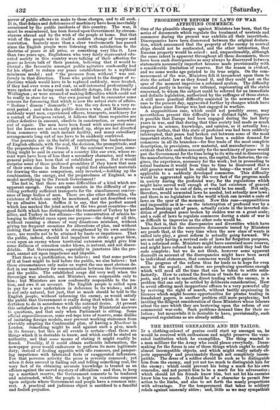PROGRESSIVE REFORM IN LAWS OF WAR AFFECTING COMMERCE.
ONE of the plausible charges against Ministers has been, that the series of documents which regulate the treatment of neutrals and commerce during the present war exhibits all their incertitude. Discrepancies have been discovered between the original declara- tion, which announced that the property of the enemy in neutral I ships should not be confiscated, and the other intimation, that
Russian property would be seized : and, unquestionably, although the same intent is apparent throughout all these documents, there have been such discrepancies as may always be discovered between statements necessarily imperfect because made provisionally with a considerable limitation of reserve. But the reason is evident, and we some weeks ago pointed to its true origin. On the com- mencement of the war, Ministers felt it incumbent upon them to state the actual law as they .found it, and they could not on the spur of the moment improvise a reformed system. The difficulty consisted partly in having no tribunal, representing all the states concerned, to whom the subject could be referred for an immediate and definite legislation, authorized by the suffrages of those states. A still more practical difficulty consisted :in the newness of the case to the present day, aggravated further by changes which have taken place since Europe was last engaged in warfare.
A supposititious case, which could not possibly occur, may nevertheless present this difficulty in a distinct light. Suppose it possible that Europe had been engaged diring the last forty years in war, and that during that time society had made as much progress in science, knowledge, and opinion, as it actually has ; suppose farther, that this state of profound war had been suddenly interrupted, that peace had broken out between some of the moat important states, and that there had been a sudden demand for commerce in all its branches—for free trade of the most complete description, in provisions, raw material, and manufactures : it is evident that this sudden necessity for the machinery of peace would put the Government for the time being to its wits-end in discovering the manufactures, the working men, the capital, the factories, the en- gines, the experience, necessary for the work ; but in proceeding to actual business it would from time to time be discovered that a still greater want would be called into being—the want of laws applicable to a suddenly developed commerce, This difficulty would be aggravated again by the very fact of the progress made in society during the profound war; for the regulations which might have served well enough at the last existence of general peace would now be out of date, or would be too small. Not only, therefore, would unwonted laws be needed, but actually new laws ; and there is no legislature in the world which can invent a code of laws on the spur of the moment. Now this case—supposititious and impossible as it is—on the interruption of profound war by a sudden breaking out of peace, actually exists in the inverted con- dition of profound peace broken by sudden war on a great scale; and a code of laws to regulate commerce during a state of war is as difficult to improvise as the other code would be. The fact is, that the discrepancies and diversities which have been discovered in the successive documents issued by Ministers are proofs that, at the very time when the new class of wants is called into play, a great reform is actually going forward. We are not only having a revived code of laws for forgotten purposes, but a reformed code. Ministers might have exercised more reserve, ' and might have refused to make any statement until they had the code complete ; but we do not think, however some apparent discredit on account of the discrepancies might have been saved to individual statesmen, that commerce would have gained.
i The progress of the reform thus far leads us to hope for even more in the sequel ; and there are perplexing questions enough which will need all the time that can be taken to settle satis- factorily. How to extend the freedom of trade for our own sub- jects, and yet not to sanction direct trading with the enemy, is a problem that can only be settled by deliberate consideration. How to avoid offering most inopportune offence to a very powerful ally by reviving the right of search, without tacitly acquiescing in licences which might become opportunities for pirates trading in fraudulent papers, is another problem still more perplexing, but inviting the diligent consideration of those Ministers whose labours attest the care which they are bestowing upon the reform of our commercial war-code. Such problems demand time for their so- lution; but meanwhile it is desirable to have, provisionally, such improved regulations as are already settled.


























 Previous page
Previous page